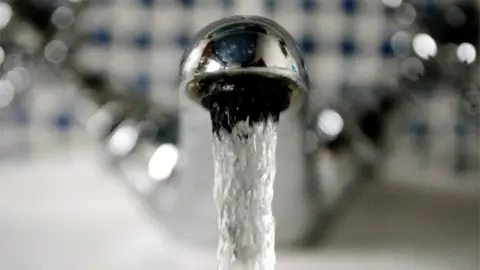Concern over toxic chemicals in tap water
 PA Media
PA MediaScientists are concerned that the allowable levels of toxic PFAS - known as "forever chemicals" - in drinking water are too high.
A BBC study found PFAS levels exceeded European safety levels in almost half of the samples taken. However, none exceeded the current safety level in England and Wales.
Linked to cancer and other diseases, PFAs are in many products such as non-stick pans, food packaging, carpets, furniture, firefighting foam.
Guidelines from the Drinking Water Inspectorate, which covers England and Wales, state drinking water must contain PFAS chemicals at no more than 100 nanograms per litre (ng/l). Above that, action must be taken to reduce levels.
Scotland is committed to enforcing European guidelines next year.
Working with the University of Greenwich and Manchester Metropolitan University, the BBC took 45 tap water samples from sites in England. Laboratory analysis found that none exceeded the 100ng/l level.
But 25 samples did contain PFASs, and four had levels that exceeded 10ng/l, which, under the current guidelines, means local healthcare professionals must be consulted, and levels monitored.
And almost half of the samples exceeded the European Food Standards Agency tolerable limit of 2.2ng/l.
Professor Roger Klein, a chemist and PFAS expert, said: "The significance of your results, even though they're small, is that it underlines that this stuff is everywhere and that it's in drinking water.
"It's ridiculous that the Drinking Water Inspectorate has a level of 100ng/l before action is taken."
Rita Lock-Caruso, Professor of toxicology at the University of Michigan, also said the results raised a potential health concern: "We're finding health effects at lower and lower concentrations - in the single digits."
Research has found the most common PFAS chemicals, PFOA and PFOS, have probable links to high cholesterol, ulcerative colitis, thyroid disease, testicular cancer, kidney cancer, and pregnancy-induced hypertension.
There is particular concern about the effect on children. Professor Philippe Grandjean, of Harvard University, said: "A woman may build this up in her body and when she gets pregnant, she shares that with her foetus. She eliminates part of her body burden into her milk. So, the next generation will get a huge dose, and the baby may end up having up to 10 times as much PFAS in the blood as her mother has."
The US is considering reducing its regulatory level, from 70ng/l.
"We are beginning to think that there's no such thing as a safe level and we want them to be as low as possible, because water is not the only source of exposure," said former head of the National Institute of Environmental Sciences, Linda Birnbaum.
However, there is little public data about its presence or impacts in the UK.
Jersey pollution
Some residents on the Channel Island of Jersey believe they are suffering adverse health impacts from drinking water contaminated with PFAS.
In the 1990s the government of Jersey discovered PFAS had polluted St Ouen's Bay aquifer, which was used by locals for drinking water.
After years of local lobbying, the government of Jersey has recently agreed to offer free blood tests for people with health issues in the area.

"I have an autoimmune disease, my father has kidney disease, and my mother has thyroid disease," says Sarah Simon, a lifelong Jersey resident turned citizen scientist.
"When I started talking to our neighbours, I found that many of the men had kidney stones and the women had thyroid disease. This can't be a coincidence."
PFOS and PFOA has been restricted and neither are manufactured in the UK now. However, there are still a raft of other PFASs which are still being used and aren't regulated.
The BBC study found 18 different types of PFAS chemicals in the tap water samples.
In a statement, the Department for Environment, Farming and Rural Affairs said: "We have robust systems in place to identify the impact of a range of chemicals on the environment and human health and are working closely with regulators to better assess the presence of PFAS in our natural environment and their sources."
Correction 5 April 2022: We mistakenly referred to the UK Drinking Water Inspectorate in our original article. This has been amended to make clear the DWI covers England and Wales and that the water samples were only taken in England.
